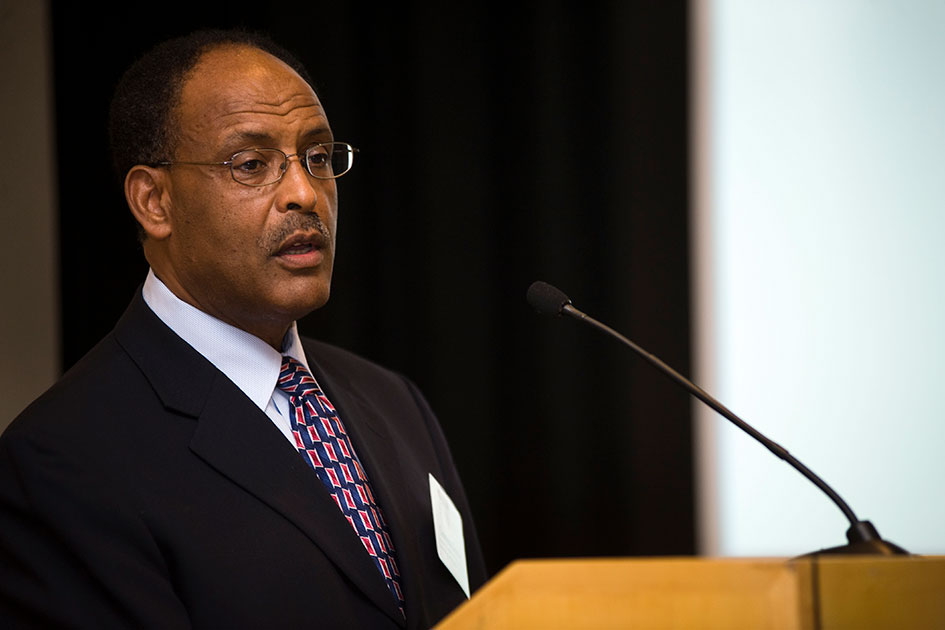
Lemma Senbet’s finance career was launched by a queue. He was waiting to register at Addis Ababa University with hopes of getting into the engineering school. But then he noticed another line, an even longer one, forming. He asked someone what it was for, and that person said that a consortium of universities started a new business school.
“I didn’t know anything about business then, or economics or finance,” says the William E. Mayer Chair Professor of Finance and Director of the Center for Financial Policy. “But I switched my line and put it down as my first choice – because it was so competitive – and engineering second.” (He was accepted into the business program.)
Like those two lines, Senbet’s career was never a single path. “Something always came up, and then things changed,” he says. He majored in accounting and left Ethiopia to pursue his MBA at UCLA. The plan was to complete the MBA and return home, but then war broke out in Ethiopia. He decided to remain in the United States and get a PhD at State University of New York at Buffalo until things settled back home. “I had never envisioned or had any goals for a PhD,” he laughs.
But then, he found himself “very marketable” and landed a job at the University of Wisconsin, teaching public and international finance and earning the Charles Albright Chaired Professorship. Then he went to the University of Maryland, where he helped build and transform Maryland Smith’s finance department. Because of his dedicated efforts to develop the department, the school named the undergraduate investments fellowship program after him. “It was a total surprise,” he says. “If you Google my name, it shows up. People ask if I gave money to get that.”
Senbet’s research focuses on corporate finance, international finance, agency and financial contracting. He has consulted for the United Nations, the World Bank, the International Monetary Fund, and other international institutions. He participates in corporate governance and teaches how finance has social impact. Though he remained in the United States, he still had continuing engagement with Africa.
“I left Africa, but Africa has not left me,” he says.
In 2013, he took a five-year sabbatical from Smith to head the African Economic Research Consortium (AERC), a nonprofit organization with a training network focused on economic research in sub-Saharan Africa. It was the first time the organization chose a finance expert to lead, and during a time when AERC was experiencing the repercussions of the global financial crisis. Senbet developed a plan to build AERC’s stability and convened nearly a dozen central banks in Africa in Zambia to join the consortium by working alongside other organizations, such as the World Bank, and allied countries. Together, they started a number of collaborative projects and research intended to inform policy, he says. He also helped enhance AERC’s finance research and training arm.
Toward the end of his tenure at AERC, the organization was ranked by the Wharton Global Think Tank Index as one of the top influential think tanks in terms of research policy, Senbet notes proudly.
Back at Smith, Senbet measures his own success through the students he’s mentored and advised. He ticks off their achievements: dean at Carnegie Mellon, bank president, chief economist of the SEC, tenures at several universities nationwide. “I’m lucky to produce students who have been impactful,” he says.
–By Rin-rin Yu, special writer for Maryland Smith
Media Contact
Greg Muraski
Media Relations Manager
301-405-5283
301-892-0973 Mobile
gmuraski@umd.edu
About the University of Maryland's Robert H. Smith School of Business
The Robert H. Smith School of Business is an internationally recognized leader in management education and research. One of 12 colleges and schools at the University of Maryland, College Park, the Smith School offers undergraduate, full-time and flex MBA, executive MBA, online MBA, business master’s, PhD and executive education programs, as well as outreach services to the corporate community. The school offers its degree, custom and certification programs in learning locations in North America and Asia.